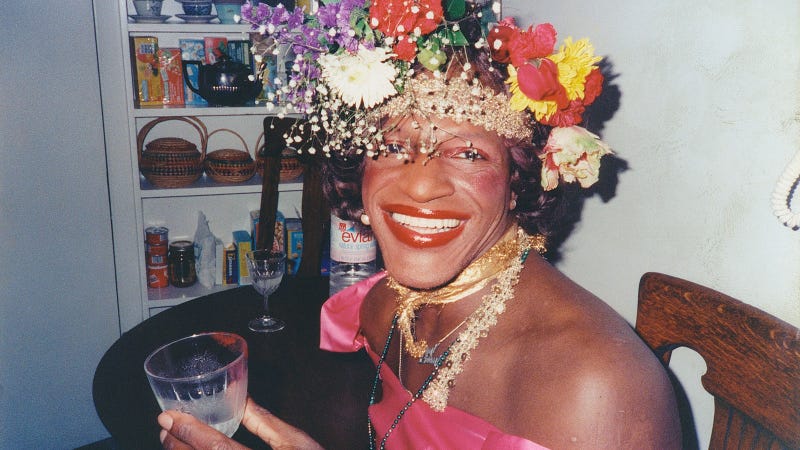Community, Leadership, Experimentation, Diversity, & Education
Pittsburgh Arts, Regional Theatre, New Work, Producing, Copyright, Labor Unions,
New Products, Coping Skills, J-O-Bs...
Theatre industry news, University & School of Drama Announcements, plus occasional course support for
Carnegie Mellon School of Drama Faculty, Staff, Students, and Alumni.
CMU School of Drama
Thursday, November 02, 2017
Who Owns Marsha P. Johnson's Story?
jezebel.com: Hours after Netflix released the documentary The Death and Life of Marsha P. Johnson last Friday, director/trans activist/researcher Reina Gossett claimed the film was unfairly profiting off her ideas and work. The Netflix doc, directed by David France (whose 2012 doc How To Survive a Plague was nominated for an Academy Award), concerns LGBTQ civil rights pioneers Marsha P. Johnson and Sylvia Rivera, whom also are the focus of an as-yet-incomplete short film Gossett has been working on with Sasha Wortzel for several years, Happy Birthday Marsha! (It’s crucial to note that Rivera identified as transgender before her death in 2002, and that Johnson, who died in 1992 before the word transgender was really embraced discursively, identified as gay, a transvestite, and a drag queen. Nonetheless, both are considered by many as icons in the trans community.)
Subscribe to:
Post Comments (Atom)

3 comments:
The question posed in the title is a trick question. Marsha P Johnson's story belongs to those of us who follow in her legacy: black trans people. This is yet another classic case of a person who is unqualified to tell the story in its fullness being the one who gets a set at the table. While I don't think it was right of Gosset to claim that France stole her story, I don't think France should be telling it. I think that if France really cared about and loved Marsha he would understand the fact that he knows nothing of her oppression and back off from making this film.
But this is bigger than just France. This is every person who tries to write about the oppression or the life and times of a marginalized person but have not experienced those daily traumas. I was instantly reminded of Lorca writing La Casa de Bernada Alba despite not being a woman in a setting where there are only other women. It ultimately comes back to write what you know. France has a story to tell too, one that is valid and relevant. It is unfair to take someone else's story and capitalize on it in this way. When Netflix let him publish this film on their platform, they were using this black woman who is dead and cannot protesters capital.
I am also reminded of my favorite Nikki Giovanni poem "Nikki Rosa". In the final lines Giovanni writes " And I really hope no white person ever has cause to write about me, because they never understand black love is black wealth and they'll probably talk about my hard childhood, and they'll never understand that all the while, I was quite happy"
Well, that didn't take long. A film made about an African American trans woman has already sparked controversy. Reina Gosset jumped on Netflix within hours of the film's release. Now, I haven't seen the film, and obviously I have zero authority to speak on the subject matter of Marsha's story. This comment will instead will focus more on the tendency for films, television shows, books, or any form of media that details the life of a minority (whether that minority is racial, sexuality, or body dis-morphemic) will always receive massive amounts of back lash. I understand that a white cis filmmaker cannot truly capture the essence and true quality of Martha. However, it does appear that there was a good chunk of research that was performed before the film was made. This film was made in order to introduce audiences to Martha and her life/ struggles. And, I would much rather have a film made by a white filmmaker who approaches the topic with respect and research than no film at all.
It kind of makes me sick that there is so much drama surrounding a story that, above all, just needs to be told and heard. I definitely understand the concerns about the theft of the work of a trans woman, particularly in relation to the work which surrounds the life of a very important trans woman, however I feel frustrated that the fact that the story is even getting a platform is getting completely overshadowed by the fact that there is so much drama and deception behind the production of the film. France somewhat mentions this in his comment on the article, he states that he would never claim that he "owns" the right to tell the story, but that the story merely needs to be told. In addition, the article kind of tiptoes around Netflix's involvement in this, and mainly focuses on France's involvement, so I have to wonder how much of a say Netflix had in all of this or if they merely just purchased the film from France without any additional influence.
Post a Comment